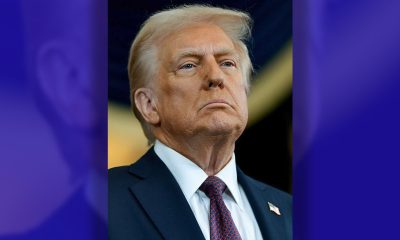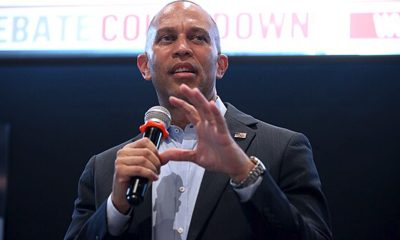National
White SC Officer Charged With Murder in Black Man’s Death

In this April 4, 2015, frame from video provided by Attorney L. Chris Stewart representing the family of Walter Lamer Scott, Scott appears to be running away from City Patrolman Michael Thomas Slager, right, in North Charleston, S.C. Slager was charged with murder Tuesday, hours after law enforcement officials viewed the dramatic video that appears to show Slager shooting a fleeing Scott several times in the back. (AP Photo/Courtesy of L. Chris Stewart)
BRUCE SMITH, Associated Press
JEFFREY COLLINS, Associated Press
NORTH CHARLESTON, S.C. (AP) — Dramatic video that shows a white South Carolina police officer shooting a fleeing black man after a traffic stop has led authorities to file a murder charge against the officer amid public outrage over a series of deaths of unarmed black men at the hands of law enforcement agents.
A protest began with about 40 to 50 people Wednesday in North Charleston, led by a group formed after the fatal shooting of another black man in Ferguson, Missouri.
The video, provided to the dead man’s family and lawyer by an unidentified person who shot the footage, shows North Charleston Patrolman Michael Thomas Slager firing eight shots at the back of Walter Lamer Scott as he runs away. The 50-year-old man falls after the eighth shot, fired after a brief pause.
Scott’s parents appeared separately on TV shows Wednesday morning, a day after the officer was charged.
Walter Scott Sr. told the NBC “Today Show” that his son may have run because he owed child support and didn’t want to go back to jail.
Scott Sr. said that in the video, the officer “looked like he was trying to kill a deer running through the woods.”
Judy Scott called the video “the most horrible thing I’ve ever seen.”
“I almost couldn’t look at it to see my son running defenselessly, being shot. It just tore my heart to pieces,” she said on ABC’s “Good Morning America.”
Attorneys for the family said the man who shot the video is assisting investigators. The person has not been identified.
North Charleston Mayor Keith Summey announced the charge at a news conference Tuesday. Summy said Slager had made “a bad decision.” Authorities said Scott was shot after the officer had already hit the man with a stun gun after a traffic stop Saturday that began over a faulty brake light.
“When you’re wrong, you’re wrong,” Summey told reporters. “When you make a bad decision, don’t care if you’re behind the shield or a citizen on the street, you have to live with that decision.”
Slager, who has been with the North Charleston police for five years, was denied bond at a first appearance hearing Tuesday. He was not accompanied by a lawyer. If convicted, he could face 30 years to life in prison.
The shooting comes amid ongoing public issues of trust between law enforcement and minority communities after such prominent deaths as those of Michael Brown in Ferguson, Missouri, and Eric Garner on Staten Island, New York.
Heightened scrutiny is being placed by Americans on police officer shootings, particularly those that involve white officers and unarmed black suspects. A grand jury declined to indict Ferguson, Missouri, officer Darren Wilson in the fatal shooting of Brown last August, leading to nationwide protests.
A local Black Lives Matter group, formed after Brown’s death, planned a demonstration Wednesday morning at North Charleston City Hall.
About 30 people gathered ahead of the planned protest Wednesday morning.
“We have to take a stand on stuff like this,” said Lance Braye, 23, who helped organize the demonstration. “We can’t just shake our heads at our computer screens.”
Scott’s family and their attorney, L. Chris Stewart, called for calm and peaceful protests. They said the murder charge showed that the justice system is working in this case.
Stewart said the video forced authorities to act quickly and decisively. “What if there was no video? What if there was no witness, or hero as I call him, to come forward?” asked Stewart.
Slager’s then-attorney David Aylor had released a statement Monday saying the officer felt threatened and that Scott was trying to grab Slager’s stun gun. Aylor dropped Slager as a client after the video surfaced.
The footage was also released to news media outlets.
The video shows an interaction between Scott and the officer, with the officer reaching at the man, the two seeming to touch near the hands, before Scott ran and was shot.
The video shows Scott falling after the shots and then the officer slowly walking toward the man and ordering him to put his hands behind his back. When Scott doesn’t move, Slager pulls his arms back and cuffs his hands. Then he walks briskly back to where he fired the shots, picks up an object, and returns the 30 feet or so back to Scott before dropping the object by Scott’s feet, the video shows.
Walter Scott may have tried to run from the officer because he owed child support, which can lead to jail time in South Carolina until it is paid, Stewart said. Scott had four children, was engaged and had been honorably discharged from the U.S. Coast Guard. There were no violent offenses on his record, the attorney said. Stewart said the family plans to sue the police department.
Justice Department spokeswoman Dena Iverson said the Federal Bureau of Investigation also will investigate.
North Charleston is South Carolina’s third-largest city. For years, it battled an economic slump caused by the mid-1990s closing of the Charleston Naval Base on the city’s waterfront. The city has bounced back since, largely because of a huge investment by Boeing, which has a 787 aircraft manufacturing plant in the city and employs about 7,500 people in South Carolina, most in North Charleston.
The city’s population was about 47 percent black in 2010, according to census figures from 2010 — the most recent data that breaks out population by race.
_____
Smith reported from Charleston, S.C. Associated Press Writer Tom Foreman Jr. in Charlotte, N.C., also contributed to this report.
Copyright 2015 The Associated Press. All rights reserved. This material may not be published, broadcast, rewritten or redistributed.
Activism
Oakland Post: Week of December 31, 2025 – January 6, 2026
The printed Weekly Edition of the Oakland Post: Week of – December 31, 2025 – January 6, 2026

To enlarge your view of this issue, use the slider, magnifying glass icon or full page icon in the lower right corner of the browser window.
Activism
2025 in Review: Seven Questions for Assemblymember Lori Wilson — Advocate for Equity, the Environment, and More
Her rise has also included several historic firsts: she is the only Black woman ever appointed to lead the influential Assembly Transportation Committee, and the first freshman legislator elected Chair of the California Legislative Black Caucus. She has also been a vocal advocate for vulnerable communities, becoming the first California legislator to publicly discuss being the parent of a transgender child — an act of visibility that has helped advanced representation at a time when political tensions related to social issues and culture have intensified.

By Edward Henderson, California Black Media
Assemblymember Lori D. Wilson (D-Suisun City) joined the California Legislature in 2022 after making history as Solano County’s first Black female mayor, bringing with her a track record of fiscal discipline, community investment, and inclusive leadership.
She represents the state’s 11th Assembly District, which spans Solano County and portions of Contra Costa and Sacramento Counties.
Her rise has also included several historic firsts: she is the only Black woman ever appointed to lead the influential Assembly Transportation Committee, and the first freshman legislator elected Chair of the California Legislative Black Caucus. She has also been a vocal advocate for vulnerable communities, becoming the first California legislator to publicly discuss being the parent of a transgender child — an act of visibility that has helped advanced representation at a time when political tensions related to social issues and culture have intensified.
California Black Media spoke with Wilson about her successes and disappointments this year and her outlook for 2026.
What stands out as your most important achievement this year?
Getting SB 237 passed in the Assembly. I had the opportunity to co-lead a diverse workgroup of colleagues, spanning a wide range of ideological perspectives on environmental issues.
How did your leadership contribute to improving the lives of Black Californians this year?
The Black Caucus concentrated on the Road to Repair package and prioritized passing a crucial bill that remained incomplete during my time as chair, which establishes a process for identifying descendants of enslaved people for benefit eligibility.
What frustrated you the most this year?
The lack of progress made on getting Prop 4 funds allocated to socially disadvantaged farmers. This delay has real consequences. These farmers have been waiting for essential support that was promised. Watching the process stall, despite the clear need and clear intent of the voters, has been deeply frustrating and reinforces how much work remains to make our systems more responsive and equitable.
What inspired you the most this year?
The resilience of Californians persists despite the unprecedented attacks from the federal government. Watching people stay engaged, hopeful, and determined reminded me why this work matters and why we must continue to protect the rights of every community in our state.
What is one lesson you learned this year that will inform your decision-making next year?
As a legislator, I have the authority to demand answers to my questions — and accept nothing less. That clarity has strengthened my approach to oversight and accountability.
In one word, what is the biggest challenge Black Californians are facing currently?
Affordability and access to quality educational opportunities.
What is the goal you want to achieve most in 2026?
Advance my legislative agenda despite a complex budget environment. The needs across our communities are real, and even in a tight fiscal year, I’m committed to moving forward policies that strengthen safety, expand opportunity, and improve quality of life for the people I represent.
Activism
2025 in Review: Seven Questions for Assemblymember Tina McKinnor, Champion of Reparations, Housing and Workers’ Rights
In 2025, McKinnor pushed forward legislation on renters’ protections, re-entry programs, reparations legislation, and efforts to support Inglewood Unified School District. She spoke with California Black Media about the past year and her work. Here are her responses.

By Joe W. Bowers Jr., California Black Media
Assemblymember Tina McKinnor (D-Inglewood) represents
California’s 61st Assembly District.
As a member of the California Legislative Black Caucus (CLBC),
McKinnor was elected in 2022. She chairs the Los Angeles County Legislative Delegation and leads the Assembly Public Employment and Retirement Committee. McKinnor also served as a civic engagement director, managed political campaigns, and worked as chief of staff for former Assemblymembers Steven Bradford and Autumn Burke.
In 2025, McKinnor pushed forward legislation on renters’ protections, re-entry programs, reparations legislation, and efforts to support Inglewood Unified School District. She spoke with California Black Media about the past year and her work. Here are her responses.
Looking back on 2025, what do you see as your biggest win?
Assembly Bill (AB) 628. If rent is $3,000, people should at least have a stove and a refrigerator. It’s ridiculous that people were renting without basic appliances.
I’m also proud that I was able to secure $8.4 million in the state budget for people coming home from incarceration. That includes the Homecoming Project, the menopause program for incarcerated women, and the Justice Leaders Program.
How did your leadership help make life better for Black Californians this year?
After the Eaton Fire, I pushed to get the same kind of support for affected areas that wealthier regions get after disasters.
I also did a lot of work building political power— establishing the Black Legacy PAC and California for All of Us PAC so we could support Black candidates and educate voters. We also called voters to make sure they understood Prop 50.
People need to understand this: there are only 12 Black legislators in the Capitol. Folks act like we can just walk in and pass reparations, but that’s not how it works.
What frustrated you most this year?
The governor did not have the political will to sign these bills: AB 57 and AB 62. They both passed overwhelmingly in the Assembly and the Senate. We did the work. The only person who didn’t have the political will to sign them was the governor.
The public needs to ask the governor why he didn’t sign the bills. We can’t keep letting people off the hook. He has to answer.
I also introduced AB 51 — the bill to eliminate interest payments on Inglewood Unified School District’s long-standing state loan — held in the Appropriations Committee. That was frustrating,
What inspired you most in 2025?
The civil rights trip to Alabama was life changing. We visited the Legacy Museum and the National Memorial for Peace and Justice. We took members of the Black, Latino, Jewish, and API caucuses with us. It changed all of us.
People aren’t always against us — they just don’t know our history.
What’s one lesson from 2025 that will shape how you approach decisions next year?
The legislative trip to Norway taught me that collaboration matters. Government, labor, and industry sit down together there. They don’t make villains. Everybody doesn’t get everything they want, but they solve problems.
What’s the biggest challenge facing Black Californians in one word?
Inequity. It shows up in housing, wealth, stress – all these things.
What’s the number one goal you want to accomplish in 2026?
Bringing back AB 57 and AB 62, and securing money for the Inglewood Unified loan interest forgiveness.
-

 Bay Area4 weeks ago
Bay Area4 weeks agoPost Salon to Discuss Proposal to Bring Costco to Oakland Community meeting to be held at City Hall, Thursday, Dec. 18
-

 Activism4 weeks ago
Activism4 weeks agoMayor Lee, City Leaders Announce $334 Million Bond Sale for Affordable Housing, Roads, Park Renovations, Libraries and Senior Centers
-

 Activism4 weeks ago
Activism4 weeks agoOakland Post: Week of December 10 – 16, 2025
-

 Activism4 weeks ago
Activism4 weeks agoOakland School Board Grapples with Potential $100 Million Shortfall Next Year
-

 Activism4 weeks ago
Activism4 weeks ago2025 in Review: Seven Questions for Black Women’s Think Tank Founder Kellie Todd Griffin
-

 Arts and Culture4 weeks ago
Arts and Culture4 weeks agoFayeth Gardens Holds 3rd Annual Kwanzaa Celebration at Hayward City Hall on Dec. 28
-

 Advice4 weeks ago
Advice4 weeks agoCOMMENTARY: If You Don’t Want Your ‘Black Card’ Revoked, Watch What You Bring to Holiday Dinners
-

 Activism4 weeks ago
Activism4 weeks agoAnn Lowe: The Quiet Genius of American Couture






















































